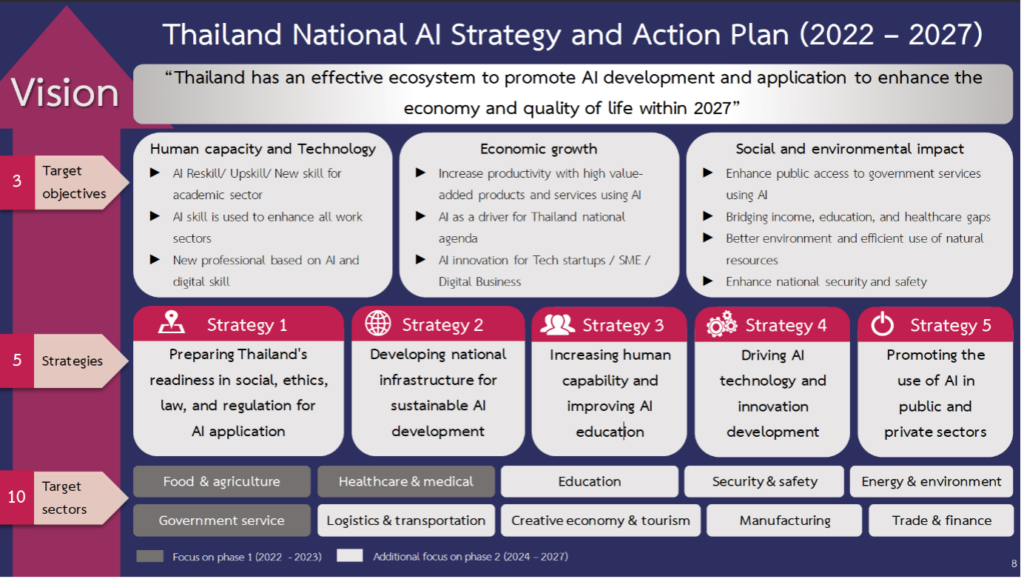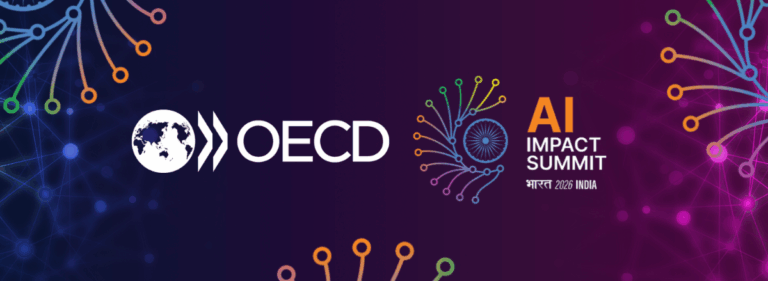Thailand’s AI strategy to boost economic and social wellbeing

Why Thailand needs an AI strategy
AI is expected to add 15 trillion U.S. dollars to the world economy over the next decade. Given the potential gains, few governments can afford to overlook the opportunity, and Thailand is no exception. This is a good opportunity for a country like ours to enhance what it already does well and diversify its economy while helping citizens to develop new skills for the future.
Comparison, the great motivator
Thailand’s AI strategy was born out of a desire to improve the country’s economic standing and the lives of its citizens, but also a competitive spirit. A decisive moment came from watching the Artificial Intelligence Readiness Index for a while, a ranking developed by Oxford Insights. At first, we were happy to see that Thailand was doing well, particularly in relation to most Southeast Asian countries. However, in 2021 our ranking dropped. This relative slip was enough to give us pause to consider what we could do better.
Looking at the reasons for our slip, we notice that Thailand did well on many of the index’s indicators but was unprepared in one important area: vision. Indeed, Thailand received a zero for vision because we had no formal national AI strategy. Naturally, this led us to consider how a coordinated strategy with measurable goals could help us to achieve greater economic and social progress with the help of AI.
Getting organised: defining responsibilities and needs
In February 2021, the government created the Thailand National AI Strategy Working Committee to continue working on the strategy initially drafted in 2020. Before diving into the details, it is important to say that two ministries came together to work on this initiative, the Ministry of Higher Education, Science, Research and Innovation, and also the Ministry of Digital Economy and Society.
As a first step to designing a strategy, we analysed our needs and defined clear objectives. This meant consulting stakeholders across government and business to set meaningful, measurable and achievable goals. To do so, we assembled a team that worked throughout 2020, conducting workshops with government agencies and meeting with the relevant actors in the private sector.
Thailand faces challenges to develop AI capacities
One of our main challenges will be to develop the human capacity and skills we need for an AI ecosystem. As of today, Thailand does not have a strongly linked community of experts. We do have some experts in AI, but they have little formal interaction. This has led us to establish a formal network and consortium. In addition to connecting existing experts in academia and industry, Thailand will train future AI professionals through formal academic programmes in Thai universities.
A look at the private sector shows that few businesses use AI because of Thailand’s low level of expertise. While there is some R&D, it is not yet ready for commercialization. This is in part because of insufficient government support and stimulation, a situation we want to change with this strategy.
We also need to increase government support by creating an AI infrastructure. This includes a technology and innovation strategy but also more education and R&D infrastructure.
Thailand’s national AI strategy and action plan
For each of our challenges, we have established a goal. But we have also set an overarching objective to serve as our shared vision: by 2027, Thailand will have an effective ecosystem for developing and applying AI, proven to enhance the economy and improve our quality of life.
From the overarching strategy, we break things down into three targeted objectives: develop human capacity and technology, create economic growth, and generate positive social and environmental impact. We have clear goals and indicators to measure our progress towards each of these objectives and five sub-strategies. Over time, we will apply the strategy to ten sectors in two phases: from 2022-23 and from 2024-27 (figure 1).

A social, ethical and legal framework
The first part of the strategy aims to prepare Thailand’s social, ethical, legal and regulatory framework for AI to guide the other objectives. This includes establishing policies and standards for AI ethics, in part based on the OECD AI Principles. To measure our success, we will study how necessary it is to have AI laws and regulations and monitor how they are enforced.
Once we have established this framework, we will raise awareness through education programmes and hope to reach at least six hundred thousand Thai citizens by the end of 2027.

A sustainable AI infrastructure
Our second strategic objective focuses on developing an infrastructure for sustainable AI development. First, we need to improve our compute capacity with a High-Performance Computing (HPC) infrastructure. Next, we plan to assemble a national network of AI experts and a national online platform for advanced data analytics and management. The plan also includes a platform that gives access to national AI services. To finance these objectives, we are asking for an annual increase in digital infrastructure spending of 10% per year.
Invest in education
From investment in infrastructure, we move to investment in human capacity through education. This third objective largely focuses on improving our AI-related university programmes and initiatives to educate the general public. We want to establish scholarships for programmes that focus on AI and create cooperation mechanisms with researchers and experts from abroad. We expect these efforts to generate more than 30 thousand AI talents over a 6-year period.
Innovation and competitivity
Next, we will apply AI to strategic sectors and develop core AI technologies to increase its use and innovation. The quantitative goal for this fourth objective is to develop at least one hundred R&D prototypes within six years. Beyond that, we hope to generate businesses with positive social impact and an accumulated value of 48 billion Baht by 2027 (1.3 billion Euros).
For all of this to be fruitful, we have set a strategy to promote the use of AI in both the public and private sectors. The focus will be on providing key industries with AI capabilities, including the system integrator industry.
We also plan to develop sandboxes and other mechanisms for business innovation with a special focus on AI start-ups. We hope to increase the number of government agencies and businesses that use innovative AI to six hundred over the next six years, and measure how and if Thailand’s AI competitiveness increases over this period of time.
🇹🇭 VISIT THAILAND’S NATIONAL AI DASHBOARD 🇹🇭
Thailand’s strategy aligns with the OECD AI Principles
The OECD AI Principles played a key role as guidance for Thailand’s National AI Strategy Working Committee when designing the strategy.
Our objective to increase human capacity and improve AI education connects well with the OECD principle 2.4 which focuses on building human capacity and preparing the labour market.
All of our objectives have an element of international cooperation, as recommended in OECD principle 2.5. Our first two objectives call for collaboration between Thai and international experts on the ethical development and use of AI, in part through international networks of experts and cooperation with international institutions. Our education objectives call for academic cooperation with researchers and experts from abroad. We also expect to develop international partnerships and co-investment in national AI projects for public and private sector AI initiatives.
A progressive approach across ten industries
During the first phase of strategy implementation, from 2022-23, we will essentially focus on the three industries: government services, food and agriculture, and healthcare and medical. The second phase of implementation from 2024-27 will cover education, logistics and transportation, security and safety, energy and environment, the creative economy and tourism, trade and finance, and finally, manufacturing.
The strategy was approved by the Prime Minister’s Cabinet Office on July 26, 2022. We are in the process of developing the national AI committee and, depending on the committee’s decision, four subcommittees will oversee the implementation of each part of the strategy. We hope that meeting our goals will help us to advance our national AI capacities enough to become an important player in international efforts to harmonize AI governance.

































